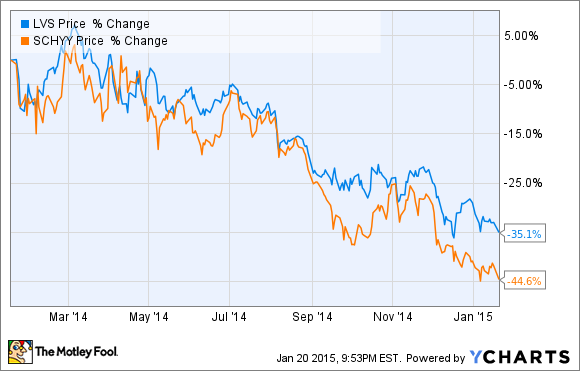As if it isn't coping with enough headaches at the moment, casino operator Las Vegas Sands (LVS 0.99%) now has a big executive post to fill. Late last week, the company's key subsidiary, Sands China (NASDAQOTH: SCHYY), announced that its president and CEO Edward Tracy is to retire, effective March 6.
Sands China wrote that he "has confirmed he has no disagreement with the Board, and there are no matters that need to be brought to the attention of the shareholders of the Company in respect of his retirement." This suggests Tracy jumped rather than was pushed. No matter the actual circumstances, though, the timing of the move isn't ideal.
Amicable separation
Sands China is essentially its parent company's presence in Macau, the Chinese enclave that hosts Asia's liveliest casino market. Tracy's nearly four-year tenure was marked by strong growth in gaming revenue for the enclave.
Until recently, that is. A recent Chinese government crackdown on corruption has shone a harsh light on VIP gamblers, the segment traditionally responsible for the bulk of Macau's gaming revenue. As a result, the overall take for the enclave has been falling notably -- by 2.6% on a year-over-year basis in 2014, with a 30% drop for the month of December alone.
This particularly impacts Las Vegas Sands because on a top-down corporate level, Macau has become its most significant single market by far. In the company's third quarter, nearly two-thirds of its total net revenue came from properties there.
So, like the other big, publicly traded casino companies doing business in the enclave -- Wynn Resorts (WYNN 0.72%), MGM (MGM -0.29%), and Melco Crown (MLCO 0.36%) -- the stock prices of both Las Vegas Sands and Hong Kong-listed Sands China have taken serious hits since the broader Macau numbers started to slip.
Weathering the cold streak
Those numbers certainly aren't pretty, but Sands China has done an admirable job keeping up its fundamentals.
In Q3, non-gambling revenue growth for the Macau properties was healthy, with take from the mall, food and beverage, hotel room, and convention/retail/other segments combined growing at 16% on a year-over-year basis.
Those high-rolling VIPs might not be rolling much these days, but the mass market for the cheaper games is doing better. For example, the company's Venetian Macao saw its slot handle (casino-speak for total take from slots) rise by 26% over the Q3 2013 figure.
Tracy, who took the CEO chair in mid-2011, deserves his share of the credit for this and probably more. After his departure was announced, several commentators noted the diplomatic approach he brought to his job. This no doubt helped the company smooth relations with local/national authorities and furthered its ambitions.
On his watch, the company opened its sprawling Sands Cotai Central on the enclave's Cotai Strip, and won final government approval for its Parisian Macao. This 3,000-room resort will also be located on the Strip and is slated to open later this year.
New boss wanted
Sands China hasn't tapped a new CEO yet, nor has it offered guidance on how it'll go about finding one, or what the timetable might be. With its difficulties in Macau, it could certainly use a steady hand like the one Tracy seemed to possess.
The good news is, during his time heading the company, it operated its business well. It also laid the ground for future growth. As such, Tracy's departure feels like quite a loss. For it and its shareholders, Sands China would likely be wise to find a replacement CEO with a similar profile.



